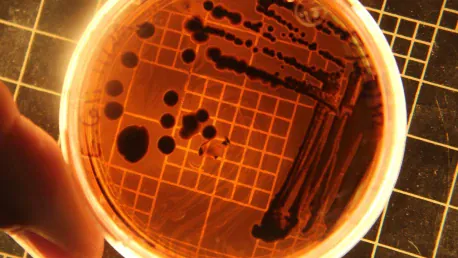Groundbreaking research, funded by Cancer Research UK and conducted by teams from the Cancer Research UK Scotland Institute in Glasgow and the University of Birmingham, has uncovered innovative ways to potentially use salmonella bacteria to combat bowel cancer. Historically known for causing food poisoning, salmonella’s role in medical treatments has remained limited due to the bacteria’s tendency to suppress immune responses essential for fighting cancer. This recent study, however, offers crucial insights into how specifically engineered salmonella could, in fact, stimulate the immune response needed to target and eliminate cancer cells.
The Role of Salmonella in Cancer Treatment
The focus of the research lies in understanding the interaction between salmonella and T cells, which are a type of immune cell critical for eradicating cancerous cells. The researchers discovered that salmonella depletes asparagine, an amino acid necessary for both tumor growth suppression and the activation of T cells. By depleting asparagine, salmonella inadvertently hinders T cell functionality, reducing their effectiveness against cancerous cells. This revelation pinpoints the specific mechanisms through which salmonella undermines the immune system’s cancer-fighting ability.
Dr. Kendle Maslowski, one of the lead researchers, emphasized the dual role of asparagine. While necessary for suppressing tumor growth, it is also critical for activating T cells. She noted the potential for engineering salmonella strains that do not deplete asparagine, thereby preserving the nutrient vital for T cell activation. This could significantly enhance the immune system’s ability to combat tumor cells, paving the way for new, more effective cancer treatments.
Historical Context and Recent Advances
The idea of using bacteria to fight cancer is not new. Research in this area dates back to the 19th century; however, the fear of pathogenic risks has often stymied progress. Recent advancements in genetic modification techniques have rekindled interest, opening promising new avenues for bacterial therapies in oncology. The ability to re-engineer bacteria like salmonella to stimulate rather than suppress the immune response represents a significant breakthrough in this field.
Dr. Alastair Copland from the University of Birmingham also expressed optimism about this development. He highlighted the longstanding puzzle within the scientific community regarding why T cells did not perform optimally when treatments used salmonella. Identifying asparagine’s role is a key discovery that could lead to improved bacterial therapies for cancer. It underscores the adaptability of microbiology and its potential for transformative breakthroughs in cancer treatment.
The Impact on Bowel Cancer Treatment
Bowel cancer remains a significant threat, being the second most common cause of cancer death in the UK, with approximately 16,800 fatalities annually. Scotland, in particular, experiences about 4,000 new cases each year. Given these figures, the findings from this research carry substantial promise for revolutionizing treatment strategies and improving patient outcomes.
Dr. Catherine Elliott, director of research at Cancer Research UK, remarked on the significant potential of bacterial therapies, despite their current lack of mainstream adoption. She emphasized that these therapies could not only fight cancer but also enhance patients’ quality of life through innovative treatment methodologies.
Future Directions and Clinical Trials
There is growing interest in the scientific community regarding the integration of bacterial therapies with immune checkpoint inhibitors. These inhibitors are drugs designed to help T cells more effectively combat cancer. By exploring combined treatment approaches, researchers hope to optimize therapies for bowel cancer and potentially other types of malignancies.
The next phase in this research involves refining the engineered strains of salmonella and comprehensively evaluating how these modifications affect overall treatment efficacy. Plans are in place to conduct clinical trials to test these engineered bacterial strains in conjunction with existing therapies. Researchers are particularly excited about the potential to treat colorectal cancer and other cancers more effectively using these novel approaches.
Broader Implications for Cancer Treatment
Groundbreaking research funded by Cancer Research UK, conducted by teams from the Cancer Research UK Scotland Institute in Glasgow and the University of Birmingham, has discovered innovative ways to potentially use salmonella bacteria to fight bowel cancer. Salmonella, historically known for causing food poisoning, has seen limited use in medical treatments due to its natural ability to suppress the immune responses essential for combating cancer. However, this recent study provides vital insights into how specially engineered salmonella can actually stimulate the immune response needed to identify and destroy cancer cells. By manipulating the bacterial properties, researchers were able to design strains of salmonella that boost the body’s immune system rather than suppress it. This new approach holds significant potential for developing more effective cancer therapies in the future. With further research, these findings could pave the way for new treatments that harness the power of bacteria to fight cancer, offering hope for patients battling this disease.









